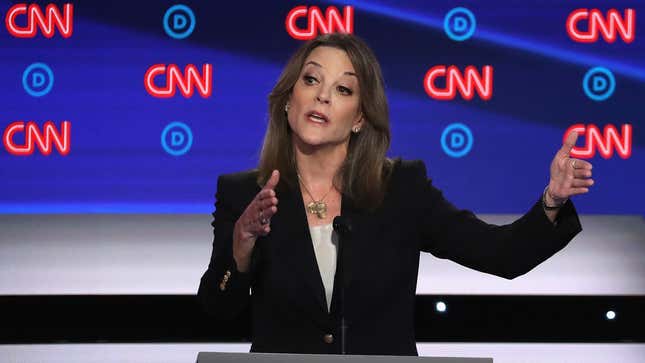

Marianne Williamson is derided as the 2020 sideshow, the New Age-y kook who thinks mind energy can conquer nuclear radiation and likens forced vaccinations to anti-abortion legislation. Her more controversial beliefs about vaccinations and mental health should be questioned, but it would be foolhardy for us or her Democratic opponents to write her off entirely. She has little chance of scooping up the nomination, but she outdoes the experienced elected officials in one realm: her ability to emote on race.
We can quibble over whether Williamson’s emotions were sincere or part of a larger grift, but they came across as genuine
This observation is not to dismiss Williamson’s more problematic stances, but one can exist with the other, and the Democratic frontrunners should take note. This was abundantly clear during the Democratic Debates last night, hosted in Detroit, Michigan, when Williamson turned her attention towards race in the United States, taking a different tactic than other candidates; she got angry, sad, defiant—she was emotional. And it resonated, especially when she spoke about environmental racism in Flint, Michegan.
“Flint is just the tip of the iceberg,” Williamson said. “We have communities, particularly communities of color, and disadvantaged communities all over the country who are suffering from environmental injustice. I assure you, I lived in Grosse Pointe. What happened in Flint would not have happened in Grosse Pointe,” she added, referring to an affluent coastal area of Michigan.
-

-

-

-

-

-

-

-

-

-

-

-

-

-

-

-

-

-

-

-

-

-

-

-

-

-

-

-

-

-

-

-

-

-

-

-

-

-

-

-








































